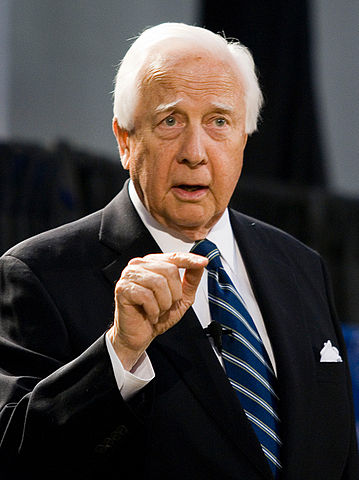In the latest SHuSH newsletter, Kenneth Whyte remembers the late David McCullough:

David McCullough speaking at Emory University, 25 April, 2007.
Photo by Brett Weinstein via Wikimedia Commons.
David McCullough died August 7 at the age of 89. He won Pulitzer Prizes for his biographies of John Adams and Harry Truman, National Book Awards for The Path Between the Seas, about the building of the Panama Canal, and Mornings on Horseback, a biography of young Theodore Roosevelt, as well as two Francis Parkman prizes (The Path, Truman) and the Presidential Medal of Freedom. He also enjoyed a prominent career as a broadcaster and several of his books were transformed into important television events, most notably HBO’s John Adams.
I read him closely over the years. Studied him, even. After finishing his major biographies — books that can’t fail to impress for their prodigious research and literary grace — I went back to his early work to trace how long it took him to develop into a master of narrative historical writing. I started at the beginning, The Johnstown Flood (1968), and was stunned to find that he was all there from page one. He had total command of his material and his story at the outset.
I wouldn’t call him a favorite writer. McCullough tended to play safe. He had a somewhat rosy view of American history: “I want to bring to life the best that can be found in the story of why we are the way we are and how we got to where we are.” He was so busy bringing the best to life that he seldom challenged his readers with the worst: truly repellant individuals or unredeemed national failure.
His subjects tended to be public-spirited men of noble character and hard-earned wisdom. He felt comfortable in their company. “It’s like picking a roommate,” he once said, explaining why he dropped the idea of a biography of Pablo Picasso. “After all, you’re going to be with that person every day, maybe for years, and why subject yourself to someone you have no respect for or outright don’t like?”
When the abhorrent forced its way into his stories, he tended to rationalize it. His formulation that Harry Truman’s decision to drop atomic bombs on Japan, killing hundreds of thousands of civilians, was a lesser evil necessary to prevent a greater evil (heavy American troop losses) may have got it exactly backward.
His paeans to American greatness even wore on American audiences in his later years. Reviews of The Pioneers, his 2019 account of the Euro-American settlement of the Ohio River valley, accused him of “romanticizing white settlement and downplaying the pain inflicted on Native Americans.”
I raise these issues not to speak ill of the dead but to say that McCullough is worth reading, and reading again, even if, like me, you’re part of the minority who can find him hard to take at times. (The majority love him: I’m not sure any historian has sold more books.)
I had the pleasure of meeting David McCullough in Toronto at an intimate lunch arranged by his publisher, Simon & Schuster. I interviewed him later for Macleans. He was a complete gentleman and an enjoyable companion, notwithstanding his many twice- and thrice-told stories (an occupational hazard for touring writers).
I was able to draw him out on various aspects of non-fiction craft, which he spoke well on. What follows are some of my favorite quotes from the interview along with several other things McCullough said about writing and one comment by another author, the great Candace Millard, about his work.



